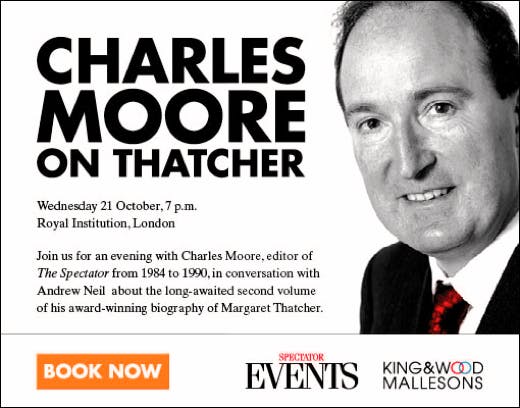As someone who has rarely written a sentence in praise of the late Sir Edward Heath, I hope I can escape charges of ‘cover-up’: I don’t believe the accusations against him. Even the word ‘accusations’ is an exaggeration, actually, since the story so far seems to be Chinese whispers with nothing amounting to evidence, put out by the frightened police. When this fashion for airing unsupported claims of child abuse has finally run its course, we shall be collectively ashamed of it, and people like Tom Watson MP will be seen for the McCarthys they are. (This is true, by the way, even if some of the things Mr Watson alleges turn out to be the case: the same applied to McCarthy.)
One should explain the culture of the period now under scrutiny. From the 1960s to the 1980s, homosexuality was emerging from criminalisation and concealment. This meant that homosexual men still dissembled and their colleagues usually covered up for them. This was not reprehensible. To do otherwise was to risk your career, particularly in politics, or to betray a friend. Party whips were much more likely to shelter homosexuals from exposure than to persecute them (though they were not above using their knowledge of their activities against them as a means of discipline). It was also true, until the 1990s, that the age of consent for homosexual acts was 21, whereas for heterosexuals it was 16. So people tended to elide homosexuality with what is now called paedophilia, speaking indiscriminately of ‘boys’. I think Heath may be the victim of this unfairness, though even his homosexuality is not proved. Odd though it may sound, if someone said ‘I fear X has a penchant for small boys’, he was probably not saying that the man was a child abuser. He might have meant simply that the man seemed to fancy teenage youths; maybe only that he was, as people then said, ‘queer’. He certainly was not saying (unless specifically stated) that he knew that the person spoken of had committed specific criminal acts against young children. He was often speaking, though again this sounds odd to modern ears, in a semi-jocular way, rather as he might have said of a heterosexual man that he was ‘not safe in taxis’ without implying that such a man was a rapist. Such phrases are now dug up and used as evidence that people knew of evil deeds and hid them, but they prove no such thing. It may well be that the culture leaned too far in believing people innocent until proved guilty, but it is even more unpleasant now that the culture leans the other way.
Last month, in Stanford, California, I had lunch with Robert Conquest, poet, historian, literary editor of this paper in the early 1960s, exposer of Soviet totalitarianism. After Conquest’s book The Great Terror (1968), it became impossible for all but the most crazed fanatic or fool to deny that Stalin had arranged the greatest system of mass murder in history (Hitler being at least his equal in iniquity, but a bit lower on the numbers). Bob turned 98 a week after I saw him. He was born just before the Bolsheviks he exposed came to power. His writing, and his advice to Margaret Thatcher, helped bring about the collapse of their horrible regime. On Monday, Bob died, cared for to the end by his wonderful wife Liddie (his fourth, and the one who lasted). His historical work was dedicated to the theme ‘the main responsibility for the century’s disaster lies not so much in the problems as in the solutions, not in impersonal forces but in human beings, thinking certain thoughts and as a result performing certain actions’.
As I left, Bob gave me, inscribed in a shaky hand, a volume of his more ribald verse called Blokelore and Blokesongs, which centres on Old Fred, a character not completely unrelated to old Bob (‘Fred’s been to marriages before/ (Though mostly to his own)…’). Fred is a sexist, of course, but not a misogynist. In ‘Fred Puts the Clock Back’, Fred laments the era when ‘A woman would “confer / Her favours on” some lucky man/ And he would “pleasure” her./ “Have sex with”, “have it off with” — this/ Jargon gives no sense/ Of all those warm benignities,/ That sweet beneficence’. Bob was a serious poet too, and a man who claimed not to fear death:
Demons don’t
Die. Hence the astonishment
They feel when faced with a quite frequent
Wish, which if they could they’d gladly grant.
Immortality may be what humans want
But knowing what it’s like to live forever
Demons don’t.
When he died, Bob was writing his memoirs. In the preface, he says he doesn’t share Stephen Spender’s excitement at famous people: ‘For example, I have been at parties where Edward Heath has been present, and could have met him … but didn’t see the need, preferring human beings.’
My thanks to all who have tried to elucidate my inquiry about what mathematics is (see Notes, 11 July). Renwick Russell says it is ‘the study not just of this universe but of all possible universes and theoretical constructs, unprejudiced by sensory input and experience’. This is certainly interesting, but does maths really examine all constructs, and are there not other, non-mathematical ways of doing so? Nigel Lawson writes that it is ‘the language of logic’, but surely it is only a language of logic. N.M. Gwynne, the great grammarian, tells me that ‘mathematics is the science of counting and measuring, no more than that.’ Indeed, maths can be ‘anti-logical’. For example, ‘You can prove mathematically that the four sides of a square are each of them minus-two feet in length, which could scarcely be more illogical.’ I feel wiser now, but something about what mathematics is still eludes me.
Just as the Duke of Wellington recommended ‘Sparrowhawks, ma’am’ as the remedy for sparrows in the Crystal Palace, so a modern Catholic prelate has a one-word answer for the problem of bats in old buildings: ‘Incense.’
Got something to add? Join the discussion and comment below.
Get 10 issues for just $10
Subscribe to The Spectator Australia today for the next 10 magazine issues, plus full online access, for just $10.
















Comments
Don't miss out
Join the conversation with other Spectator Australia readers. Subscribe to leave a comment.
SUBSCRIBEAlready a subscriber? Log in